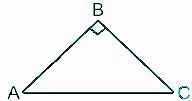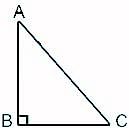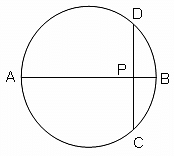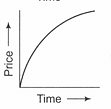KTET Paper 1: Mathematics Test - 9 - KTET MCQ
30 Questions MCQ Test - KTET Paper 1: Mathematics Test - 9
Sequence the following tasks as they are taken up while developing the concept of measurement:
a) Learners use standard units to measure length.
b) Learners use non-standard units to measure length.
c) Learners verify objects using simple observation.
d) Learners understand the relationship between metric units.
a) Learners use standard units to measure length.
b) Learners use non-standard units to measure length.
c) Learners verify objects using simple observation.
d) Learners understand the relationship between metric units.
| 1 Crore+ students have signed up on EduRev. Have you? Download the App |
While solving a problem based. on ‘Pythagoras theorem’, a teacher draws the following triangle ABC.

Rajan argued that the triangle ABC is not drawn correctly. The only way to draw it is

Rajan has the misconception as

Rajan argued that the triangle ABC is not drawn correctly. The only way to draw it is

Rajan has the misconception as
Consider a circle with diameter AB and chord CD = 4 cm and PB = 1 cm. What will be the radius of the circle?

Computational skills in Mathematics can be enhanced by:
Hamida always allows her students to observe the no pattern and to form conjecture on their own in order to enhance their mathematical abilities she wrote the following problems on the board and asked the students to write the answer
21÷7 =
2.1÷0.7 =
0.21÷0.07 =
0.021÷0.007 =
Throughout the set of questions she wants the students to observe that _____.
Which two numbers, when multiplied, give the product 24?
This question
Often, children are asked to solve a word problem, they comment, 'if you tell me which operation to use, I'll solve it.' What is the possible reason for such a response?
Vikas teaches mathematics to a class of 56 students. He believes that conducting a test is effective if the feedback is given immediately. He conducted a short class test of 10 marks. What is the best possible way of giving the feedback effectively?
Which of the following philosophical studies come(s) under the philosophy of mathematics?
The sum of the greatest 4-digit number and the smallest 3-digit number is:
What is the nature of mathematics?
I. Logical
II. Precise
III. Symbolic
IV. Study of structures
'Practice Time' included in different topics in Mathematics textbooks aims at
The interesting titles of chapters in the textbook of mathematics:
The reasons for keeping Mathematics in school curriculum is/are
Mr. Fredrick is a teacher who starts teaching the students first by teaching very simple problems and then gradually moving to complex problems. This type of teaching style is best suited for
Miss reena uses a grid activuty, to teach the concept of manipulation of decimals. a sample is illustrated below:
Through this method, Miss Reena is:
Given below are some statements related to measurement. Sequence the statements to form a chronology in teaching measurement of length:
(i) Using a ruler to measure lengths in centimetres
(ii) Using standard units to measure the length
(iii) Using non-standard units to measure the length
(iv) Arranging the objects from smallest to longest
A colleague told to Mr. Iyer that a certain scheme gives simple interest double the amount invested initially. As Mr. Iyer is in need of accumulating lump sum for his daughter's marriage in the next few years, he invested in the scheme. In how many years does the invested amount give a simple interest equal to the original invested amount. Assume an interest rate of 8% per month.
Classroom discussion was initiated in class 5 on sale in festival session, during the topic of percentage. This type of discussion in classroom_____.
What shall be the rubrics of assessment to check the concept of shapes in Class II?
"These days prices have started rising." Which amongst the following graphs represents this situation?
A teacher asked her students to make maths thesaurus and make note of the terminologies that they come across while doing mathematics. Her objective is to
Which of the following branches of mathematics is used in engineering?
As per NCF 2005, teaching of numbers and operations on them, measurement of quantities, etc at the primary level caters to the:
Assertion (A): Students should be told to follow the prescribed steps of solving problems.
Reason (R): Use traditional and same assessment tools for the whole class for assessing learners’ progress in Mathematics.
Choose the correct answer from the following code :



















